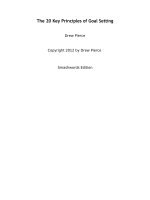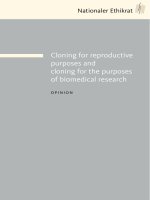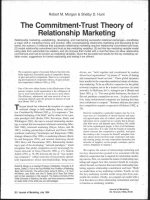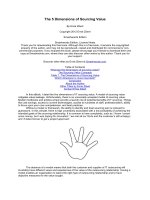Two Hundred Years of Accounting Research pot
Bạn đang xem bản rút gọn của tài liệu. Xem và tải ngay bản đầy đủ của tài liệu tại đây (2.45 MB, 630 trang )
Two Hundred Years of Accounting
Research
This book offers a rich survey of the efforts that accounting academics, and
often enough theoretically inclined practitioners, have invested in accounting
research during a 200-year period. Although there are several prominent histor-
ical books and encyclopaedias on accounting history, an integrated work con-
centrating on accounting research from an international point of view has long
been overdue.
Mattessich’s book is the first and only one to offer a comprehensive survey of
accounting research on a broad international scale for the last two centuries. Its
main emphasis is on accounting research in the English, German, Italian, French
and Spanish language areas; it also contains chapters dealing with research in
Finland, the Netherlands, Scandinavia, Russia, Poland and the Ukraine as well
as Argentina and Japan. A separate chapter summarizes research activity in the
rest of the globe from Eastern Europe to Israel, the Arab and African countries
as well as India, China and other countries of the Far East.
In a time of financial globalization, familiarity with accounting research in
countries beyond the English language boundary is no less important than
familiarity with the recent, comprehensive research activity in the English lan-
guage area. This book fulfils both of those needs; it may serve practitioners and
auditors all over the world, no less than students of accounting interested in the
evolution of its research efforts. It also offers a survey of the present state of
the art (from empirical to analytical accounting and from such esoteric subjects
as gender issues to the archaeology of accounting); finally, it casts a glance into
the future.
Richard Mattessich is Professor Emeritus of Accounting at the Sauder School
of Business, University of British Columbia, Canada. He has received many
awards and is profiled in such works as Edward’s Twentieth Century Accounting
Thinkers, Chatfield and Vangermeersch’s A History of Accounting – An Inter-
national Encyclopedia and Colasse’s Les Grands Auteurs en Comptabilité.
Routledge new works in accounting history
Edited by
Garry Carnegie
Melbourne University Private, Australia
John Richard Edwards
Cardiff University, UK
Salvador Carmona
Instituto de Empresa, Spain
Dick Fleischman
John Carroll University, USA
1 The Institute of Accounts
Nineteenth-century origins of accounting professionalism in the United
States
Stephen E. Loeb and Paul J. Miranti, Jr
2 Professionalism and Accounting Rules
Brian P. West
3 Accounting Theory
Essays by Carl Thomas Devine
Edited by Harvey S. Hendrickson and Paul F. Williams
4 Mark to Market Accounting
‘True North’ in financial reporting
Walter P. Schuetze, edited by Peter W. Wolnizer
5 A History of Auditing
The changing audit process in Britain from the nineteenth century to the
present day
Derek Matthews
6 Contemporary Issues in Financial Reporting
A user-oriented approach
Paul Rosenfield
7 The Development of the American Public Accountancy Profession
Scottish chartered accountants and the early American public accountancy
profession
T.A. Lee
8 Two Hundred Years of Accounting Research
An international survey of personalities, ideas and publications (from the
beginning of the nineteenth century to the beginning of the twenty-first
century)
Richard Mattessich
Two Hundred Years of
Accounting Research
An international survey of
personalities, ideas and publications
(from the beginning of the nineteenth
century to the beginning of the twenty-
first century)
Richard Mattessich
University of British Columbia, Vancouver, B.C., Canada
in collaboration with (in alphabetical order): Svetlana M. Bychkova (St Peters-
burg State Agricultural University), Daniel Carrasco Díaz (University of
Málaga, Spain), Jean-Guy Degos (University Montesquieu of Bordeaux,
France), Belén Fernández-Feijóo Souto (University of Vigo, Spain), Giuseppe
Galassi (University of Parma, Italy), M. Frendzel (University of
Lodq), Esteban
Hernández Esteve (University Autónoma of Madrid), Alicja Jaruga (University
of
Lodq), Yoshiaki Koguchi (Chuo University, Tokyo), Hans-Ulrich Küpper
(Maximilian University of Munich), Konstantin Redchenko (Academy of Com-
merce, Lvóv, Ukraine), Yaroslav V. Sokolov (St Petersburg Institute of
Commerce and Economics), Anna Szychta (University of
Lodq), Enrico Viganò
(University of Naples), Cristina Wirth (University of San Andrés, Buenos Aires)
First published 2008
by Routledge
2 Park Square, Milton Park, Abingdon, Oxon OX14 4RN
Simultaneously published in the USA and Canada
by Routledge
270 Madison Ave, New York, NY 10016
Routledge is an imprint of the Taylor & Francis Group, an informa business
© 2008 Richard Mattessich
All rights reserved. No part of this book may be reprinted or reproduced or
utilized in any form or by any electronic, mechanical, or other means, now
known or hereafter invented, including photocopying and recording, or in
any information storage or retrieval system, without permission in writing
from the publishers.
British Library Catalogu
ing in Publication Data
A catalogue record for this book is available from the British Library
Library of Congress Cataloging in Publication Data
A catalog record for this book has been requested
ISBN10: 0-415-77256-7 (hbk)
ISBN10: 0-203-93985-9 (ebk)
ISBN13: 978-0-415-77256-3 (hbk)
ISBN13: 978-0-203-93985-7 (ebk)
This edition published in the Taylor & Francis e-Library, 2007.
“To purchase your own copy of this or any of Taylor & Francis or Routledge’s
collection of thousands of eBooks please go to www.eBookstore.tandf.co.uk.”
ISBN 0-203-93985-9 Master e-book ISBN
To Hermi
Preface xvii
Acknowledgements xix
1 Introduction 1
1.1 The need for a broad international survey 1
1.2 Accounting research as an intellectual endeavour 2
1.3 The methodology pursued 5
1.4 Overview of the book 7
1.5 General remark to the reference sections of all chapters 20
2 The nineteenth century: an international survey 21
2.1 The pioneers of early accounting research 21
2.2 Theories of ‘accounts’ 23
2.3 Personalistic versus materialistic theories of ‘accounts’ 25
2.4 The proprietary theory 27
2.5 The entity theory 29
2.6 Other accounting theories 30
2.7 Developments in budgeting, valuation, depreciation and
costing 31
2.8 Further advances, particularly in cost and factory
accounting 34
2.9 Concluding remarks 37
2.10 Appendix 39
3 German language area: first half of the twentieth
century 41
3.1 Introduction 41
3.2 ‘Accounts’ as the centre of theories 43
3.3 Inflation after the First World War and accounting
theories 46
Contents
3.4 Competing Bilanztheorien 48
3.5 Charts and master charts of accounts and state
interference 58
3.6 Cost accounting and its contributions 59
3.7 Publications on accounting history (1900–50) 63
3.8 The international influence of German accounting 64
4 German language area: second half of the twentieth
century 66
4.1 Introduction 66
4.2 Financial accounting theories 66
4.3 Cost and managerial accounting 73
4.4 Historical accounting research by Germans, Austrians and
Swiss (1950–2000) 80
4.5 Accounting academics’ attitudes in Germany, Great Britain
and North America 81
5 Accounting research in Italy: first half of the twentieth
century 84
5.1 Introduction 84
5.2 Late publications by Cerboni, Rossi and Besta 85
5.3 Zappa’s contributions 87
5.4 Studies in cost accounting 95
5.5 Theoretical accounting studies by other Italian scholars 97
5.6 Italian scholars and accounting history 97
6 Accounting research in Italy: second half of the
twentieth century 101
6.1 Introduction 101
6.2 Ragioneria and economia aziendale 101
6.3 Financial accounting 103
6.4 Cost and managerial accounting 108
6.5 Novel accounting trends 109
6.6 Historical studies of the period 110
7 Accounting research in the French language area:
first half of the twentieth century 113
7.1 Introduction 113
7.2 Studies in accounting history 113
7.3 Theory and practice of financial accounting 114
7.4 Cost accounting and managerial control 116
7.5 Inflation and price-level adjustments 118
x Contents
7.6 Charts of accounts and public supervision 122
7.7 Conclusion 124
8 Accounting research in the French language area:
second half of the twentieth century 125
8.1 Introduction 125
8.2 General financial accounting, social and governmental
accounting 127
8.3 International accounting harmonization and related
topics 130
8.4 Matrix methods and event theory 131
8.5 Cost and managerial accounting 132
8.6 French historical studies in accounting 135
9 Accounting publications and research in Spain: first
half of the twentieth century 138
9.1 Introduction 138
9.2 Main doctrinal trends and major topics of Spanish
studies 139
9.3 Accounting as a science 139
9.4 Major accounting theories 140
9.5 Purpose of accounting, and information for decision
making 140
9.6 Government accounting 141
9.7 Specialized accounting 141
9.8 Accounting adjustments and the Spanish term of
‘balance’ 141
9.9 Classification of accounts 142
9.10 Classification of transactions and entries 142
9.11 Principles of asset valuation 143
9.12 Depreciation 144
9.13 Cost accounting 144
9.14 Inflation issues and gold currency 146
9.15 Auditing 146
9.16 Studies in accounting history 146
9.17 Practical orientation of Spanish texts 147
9.18 Further details on prominent Spanish accounting
scholars 148
9.19 Conclusion 150
Contents xi
10 Accounting publications and research in Spain:
second half of the twentieth century 152
10.1 Introduction 152
10.2 General theoretical studies 155
10.3 Specialized theoretical studies 156
10.4 Studies in auditing 158
10.5 Methodological studies 159
10.6 Cost and managerial accounting 160
10.7 Studies in accounting history 161
10.8 Institutional developments and future prospects 163
10.9 Conclusion 164
11 Accounting research in the English language area:
first half of the twentieth century 166
11.1 Introduction 166
11.2 Financial accounting and auditing 166
11.3 Advances in cost accounting 175
11.4 Studies in accounting history 178
11.5 Conclusion 179
12 Accounting research in the English language area:
second half of the twentieth century 180
12.1 Introduction 180
12.2 The 1950s: emergence of a new academic spirit 182
12.3 The 1960s: a golden age of a priori accounting 184
12.4 The 1970s and the new direction of accounting research 191
12.5 The 1980s and 1990s: diversification, consolidation and
model building 197
12.6 The best-selling spreadsheet programs for the personal
computer 213
12.7 Tax accounting, international accounting, governmental
accounting and some specialized areas 213
13 Accounting research in Finland, the Netherlands
and the Scandinavian countries during the entire
twentieth century 216
13.1 Accounting research in Finland 216
13.2 Accounting research in the Netherlands 221
13.3 Accounting research in the Scandinavian countries 226
xii Contents
14 Accounting publications and research in
twentieth-century Japan 230
14.1 Introduction 230
14.2 Early contributions in the twentieth century 230
14.3 Later developments in general accounting theory 234
14.4 Ecological or environmental accounting 240
14.5 Cost and managerial accounting 241
14.6 Historical accounting studies 242
14.7 Epilogue 244
15 Accounting publications and research in twentieth-
century Russia 246
15.1 Introduction 246
15.2 Academic accounting in twentieth-century Imperial
Russia 247
15.3 Accounting publications and research of Soviet Russia
before 1930 250
15.4 Soviet Russia under Stalin: accounting publications and
research 253
15.5 Accounting publications and research in the Russian
Federation 260
16 Accounting publications and research in Poland and
the Ukraine: mainly twentieth century 264
16.1 Introduction 264
16.2 Poland 264
16.3 The ‘occupied’ Ukraine 269
16.4 Formation of modern accounting and auditing in the
independent Ukraine (1991 to the beginning of the twenty-
first century) 273
17 Accounting books of Argentina: publications, research
and institutional background 276
17.1 Introduction and methodology 276
17.2 Evolution of the Argentine accounting profession 277
17.3 Evolution of the Argentine academic accounting community
and its impact on accounting legislation 278
17.4 Argentine accounting publications and the foreign influence:
the first half of the twentieth century 282
17.5 Argentine publications: first half of the twentieth
century 284
Contents xiii
17.6 Argentine publications: second half of the twentieth century
and beyond 286
17.7 Concluding remarks 293
18 Accounting in other countries: publications and
research reports 295
18.1 Introduction 295
18.2 Some Eastern European countries, and Israel 295
18.3 The Portuguese language area (Portugal and Brazil) 296
18.4 Some Latin American countries (excluding Argentina and
Brazil) 297
18.5 Arab and other Moslem countries, as well as some African
countries 298
18.6 Some countries of the Far East 299
18.7 Publications on developing countries in general 300
19 The information economic perspective and the future
of accounting 301
19.1 Introduction 301
19.2 Recent books by the two pioneers and their
collaborators 303
19.3 Information vs. value? 305
19.4 Methodological differences between the information
perspective and traditional accounting theory 308
19.5 Major tenets of the information perspective 309
19.6 Issued beyond the competency of the information
perspective 315
19.7 Opposition and criticism 316
19.8 Towards a general theory of accounting 319
19.9 Conclusion from a wider angle 321
Notes 1: Introduction 323
Notes 2: The nineteenth century: an international survey 323
Notes 3: German language area: first half of the twentieth
century 326
Notes 4: German language area: second half of the twentieth
century 328
Notes 5: Accounting research in Italy: first half of the twentieth
century 329
Notes 6: Accounting research in Italy: second half of the
twentieth century 330
Notes 7: Accounting research in the French language area: first
half of the twentieth century 331
xiv Contents
Notes 8: Accounting research in the French language area:
second half of the twentieth century 332
Notes 9: Accounting publications and research in Spain: first
half of the twentieth century 333
Notes 10: Accounting publications and research in Spain:
second half of the twentieth century 333
Notes 11: Accounting research in the English language area:
first half of the twentieth century 333
Notes 12: Accounting research in the English language area:
second half of the twentieth century 334
Notes 13: Accounting research in Finland, the Netherlands and
the Scandinavian countries during the entire twentieth
century 335
Notes 14: Accounting publications and research in
twentieth-century Japan 335
Notes 15: Accounting publications and research in
twentieth-century Russia 336
Notes 16: publications and research in Poland and the Ukraine:
mainly twentieth century 337
Notes 17: Accounting books of Argentina: publications,
research and institutional background 338
Notes 18: Accounting in other countries: publications and
research projects 338
Notes 19: The information economic perspective and the future
of accounting 338
References 1: Introduction 342
References 2: The nineteenth century: an international survey 343
References 3: German language area: first half of the twentieth
century 360
References 4: German language area: second half of the
twentieth century 377
References 5: Accounting research in Italy: first half of the
twentieth century 395
References 6: Accounting research in Italy: second half of the
twentieth century 412
References 7: Accounting research in the French language
area: first half of the twentieth century 420
References 8: Accounting research in the French language
area: second half of the twentieth century 426
References 9: Accounting publications and research in Spain:
first half of the twentieth century 436
References 10: Accounting publications and research in Spain:
second half of the twentieth century 439
References 11: Accounting research in the English language
area: first half of the twentieth century 455
Contents xv
References 12: Accounting research in the English language
area: second half of the twentieth century 465
References 13: Accounting research in Finland, the
Netherlands and the Scandinavian countries during the
entire twentieth century 505
References 14: Accounting publications and research in
twentieth-century Japan 518
References 15: Accounting publications and research in
twentieth-century Russia 528
References 16: publications and research in Poland and the
Ukraine: mainly twentieth century 535
References 17: Accounting books of Argentina: publications,
research and institutional background 542
References 18: Accounting in other countries: publications and
research projects 552
References 19: The information economic perspective and the
future of accounting 558
Index of names 562
Subject index 590
xvi Contents
Preface
This book is based on a series of papers and other material that the author (occa-
sionally in co-authorship with others – see Acknowledgements) has written
during the last decade or more. Several of these papers were from the very
outset intended to be integrated in this book, but no chapter is identical to any
previously published material. Other chapters are new and exclusive to this
book. We hope that this is more than a collection of incidental articles but a sys-
tematic survey of the efforts that academics and theoretically oriented account-
ing practitioners made over a period of some 200 years.
Although we tried to put special emphasis on countries where most of the
original accounting research occurred, we wanted to cover the academic
accounting community of many countries and language areas. This made it
necessary to include occasionally even textbooks and similar publications
from authors that became prominent not so much through their originality but
due to their prolific writing, charisma or other qualities. We believe that the
publication efforts of no language area ought to be disregarded and we tried,
wherever possible, to pay attention to valiant efforts of promoting the creation
and spreading of accounting knowledge in a variety of countries or language
areas. Such an attitude seems to be particularly important at a time of eco-
nomic globalization.
Despite the availability of several excellent historical books and encyclopae-
dias on accounting history (see the Introduction), an integrated work concentrat-
ing on the history of accounting research from a general and international point
of view has, so far, been lacking. In a time of intensive and international acade-
mic exchange, the need to be informed about past and present accounting
research in other countries is greater than ever.
Thus, our focus is not on the history of accounting, but on the history of its
research and the publications underlying it (though, wherever necessary,
accounting facts beyond research were taken into consideration). Nor is the book
merely based on accounting literature of the English tongue. A major goal was
to offer a broad overview, covering the pertinent publications of an international
spectrum, as wide as possible, under the given limitations. Indeed, the book has
its origin in our personal curiosity about accounting research in the past, and not
only in the English tongue but in other languages as well.
One of the most difficult tasks in organizing the material was the selection of
publications to be discussed or listed. Obviously, the choice of what to include
or exclude depended, at least to some degree, on a personal point of view. We
endeavoured to include material significant enough to withstand the test of time –
even if we may not always have succeeded in this effort from the point of an
international perspective. Occasionally, we had to take local preferences into
account; we also had to rely on many secondary sources and their value judge-
ments, as the material that presented itself to us was enormous.
We hope that this book will guide the reader and inspire her or him to turn
occasionally to the more specialized literature here listed. The book may also
serve accounting historians as a reference work for many years to come, and be
an impetus to scholars for delving deeper into historical aspects not yet revealed.
R.M.
xviii Preface
Acknowledgements
(including copyrights)
First of all, I should like to express my thanks to the Social Sciences and
Humanities Research Council of Canada for its financial support over several
decades (in particular for the grant from the year 2002 onwards, pertaining,
among others, to this special project). Further thanks go to the Sauder School of
Business (formerly, Faculty of Commerce) of the University of British Colum-
bia in Vancouver, its Dean, colleagues, and staff for their unrelenting personal
support and the use of research facilities. This also refers to my occasional
research assistants, Ms Pattarin Adithipyang, Mr Huasheng Gua, Mr Hamed
Mahmudi and Ms Kim Trottier, to all of whom I am much obliged for compre-
hensive proof reading.
Second, I extend my sincere gratitude to all the friends and colleagues who
contributed to this book with great enthusiasm and much competence. Indeed,
the vast correspondence – counting hundreds of e-mail letters in the effort to
correct and improve the individual chapters – is witness to this cooperative
enterprise.
Related to this are my thanks to various editors and publishers (of the
Accounting, Business and Financial History/Routledge; the Review of Account-
ing and Finance/Barmarik Publications, East Yorkshire, UK; De Computis/Aso-
ciación Española de Contabilidad, Madrid; the Asia-Pacific Journal of
Accounting/City University of Hong Kong; and Canadian Accounting Perspec-
tives/Canadian Academic Accounting Association) for granting copyrights
wherever material from previous publications was used in this book. This refers
to the following publications (in order of Chapters):
Mattessich, R. (2003) ‘Accounting research and researchers of the nineteenth
century and the beginning of the twentieth century’, Accounting, Business and
Financial History 13 (2, July): 125–79 (as basis for Chapter 2).
Küpper, H U. and Mattessich, R. (2005) ‘Twentieth-century accounting
research in the German language area’ Accounting, Business and Financial
History (Special issue on German Accounting) 15 (3): 345–410 (as basis for
Chapters 3 and 4).
Galassi, G. and Mattessich, R. (2004) ‘Italian accounting research in the first
half of the twentieth century’, Review of Accounting and Finance 3 (2): 61–82
(as basis for Chapter 5).
Viganò, E. and Mattessich, R. (2007) ‘Accounting research in Italy: second
half of the twentieth century’, Review of Accounting and Finance 6 (1): 24–41
(as basis for Chapter 6).
Degos, J G. and Mattessich, R. (2003) ‘Accounting research in the French
language area: the first half of the twentieth century,’ Review of Accounting and
Finance 2 (4): 110–28 (as basis for Chapter 7).
Degos, J G. and Mattessich, R. (2006) ‘Accounting research in the French
language area: second half of the twentieth century’, Review of Accounting and
Finance 5 (4): 423–42 (as basis for Chapter 8).
Carrasco Díaz, D., Hernández Esteve, E. and Mattessich, R. (2004) ‘Account-
ing publications and research in Spain: first half of the twentieth century’,
Review of Accounting and Finance 3 (2): 40–58 (as basis for Chapter 9).
Fernández-Feijóo Souto, B. and Mattessich, R. (2006) ‘Accounting research
in Spain: second half of the twentieth century and beyond’, De Computis 5:
7–38 (as basis for Chapter 10).
Mattessich (previously unpublished) ‘Accounting research in the English lan-
guage area: first half of the twentieth century’ (as Chapter 11).
Mattessich (1996a, 1996b) ‘Academic research in accounting: the last 50
years’; and ‘Accounting research: response to commentators’, both Asia-
Pacific Journal of Accounting 3 (1, June): 3–81, 109–35 (as a partial basis for
Chapter 12).
Mattessich (previously unpublished) ‘Accounting research in Finland, the
Netherlands and the Scandinavian countries’ (as Chapter 13).
Koguchi and Mattessich (previously unpublished) ‘Japanese accounting
publications and research in the twentieth century’ (as Chapter 14).
Bychkova, Mattessich and Sokolov (previously unpublished) ‘Accounting
publications and research of twentieth-century Russia’ (as basis for Chapter 15)
Jaruga, Szychta, Frenzel and Mattessich (Part I: Poland) and Redchenko and
Mattessich (Part II: Ukraine). Both parts of ‘Accounting publications and
research in Poland and the Ukraine: mainly twentieth century’ (as basis for
Chapter 16) were previously unpublished.
Wirth, C. and Mattessich, R. (2006) ‘Accounting books of Argentina:
publications, research and institutional background’, De Computis 11 (4, June):
137–67 (as basis for Chapter 17).
Mattessich (previously unpublished) ‘Accounting in other countries: publica-
tions and research reports’ (as Chapter 18).
Mattessich, R. (2006) ‘The information economic perspective of accounting:
its coming of age’, Canadian Accounting Perspectives 5 (2): 209–36 (as basis
for Chapter 19).
xx Acknowledgements
1 Introduction
The history of accounting is similar to that of philosophy.
It is a history of doctrines. It also is a history of methods.
At best, it is one of representing financial realities –
though in a pragmatic way.
R.M.
1.1 The need for a broad international survey
This book offers a survey of the efforts that accounting academics, and often
enough theoretically inclined practitioners, have invested in accounting publica-
tions and research during a period of about 200 years. Some of these efforts have
been previously exposed in such works as, for example, Gaffikin and Aitken’s
(1982) The development of accounting theory: significant contributors to
accounting thought in the twentieth century, Edwards’s (1994) Twentieth-century
accounting thinkers, Chatfield and Vangermeersch’s (1996) The history of
accounting: an international encyclopedia, and, finally, Colasse’s (2005) Les
grands auteurs en comptabilité (covering some 23 scholars from Pacioli to our
time). All these are excellent historical works (and I personally owe their editors
and authors much for recognition of my own contributions to accounting
research), but those books pursue a different goal. Their approach, in discussing a
relatively small group of distinguished publications and scholars, is more ‘aristo-
cratic’ than ours.
1
We, in contrast, have endeavoured to offer a very broad
perspective of publications and authors on a more international scale, and thus
have chosen a more ‘democratic’ approach. This enabled us to present a large
number of pundits and their contributions, even where they attained only ‘local
recognition’. For this reason, some experts might view this book as ‘a catalogue
of names and publications’. Indeed, the book is designed to serve, among other
things, as such a catalogue – but, hopefully, it is much more than that. On the
other hand, we fully realize the limitations of this book, particularly the dif-
ference in quality between different chapters. As much as we tried to overcome
this weakness, it was too deeply rooted, not only in the time and space limita-
tions, but above all, in the immense difficulties to access sufficient material from
some countries or language areas. This book, as so much of human endeavour, is
an attempt to do the best under adverse circumstances.
Nevertheless, we believe that such an integrated work, concentrating on aca-
demic accounting publications and research from a truly international point of
view, has long been overdue. Yet, our focus is not on the history of accounting
practice, rather it is limited to research and the publication activity underlying
it. As pointed out in the Preface, a major goal was to offer a broad view, cover-
ing the pertinent literature in many languages and countries. The major language
areas taken into consideration here are those of English, French, German,
Italian, Japanese, Spanish and Russian. We also included a separate chapter on
Argentina and on accounting contributions from the Netherlands and Northern
Europe (the Scandinavian countries). Another chapter offers representative
examples of accounting publications and research efforts referring to other
countries (from Eastern Europe to Africa and Asia, including India and China).
On rare occasions we have referred to publications on ‘business economics’
(Betriebswirtschaftslehre, economia aziendale, bedrijfseconomie, etc.), particu-
larly wherever accounting subjects are included or implied. But in general, we
have limited this book to the theory and research of accounting.
1.2 Accounting research as an intellectual endeavour
Although by no means independent of accounting practice or other disciplines, the
literature of accounting has become an important cultural manifestation in its own
right. Indeed, the big challenge ahead is to reconcile the ever-increasing sophisti-
cation of theoretical accounting with the need of practice for relatively simple or,
at least, transparent accounting systems that are comprehensible to the working
accountant as well as the reader of financial statements. The ‘quasi-legislation’ on
current value accounting of the FASB (USA) in the late 1970s and early 1980s
showed that even the relatively simple models of replacement value and inflation
adjustments were too complicated for most practitioners and financial analysts.
How then, will the much more complex models of the information economic
perspective relate to accounting practice? For a better understanding of these dif-
ficulties, we have tried to make a more emphatic distinction between accounting
practice, on one side, and the cultural manifestation of academic accounting, on
the other side. This does not imply that accounting theory is independent of
accounting practice or is even a positive science. On the contrary, we firmly
believe that ours is an applied discipline in the service of a practical goal.
However, the quest for a study of the evolution of different research efforts,
directions and trends (as well as their contributors), might not be so much differ-
ent from the need for museums, galleries and historical collections in other intel-
lectual pursuits. We believe that the ideas and publications of prominent
accounting scholars deserve no less respect from accountants than the attention
given to major painters by art scholars, to literary figures by experts of literature,
to composers by musicians, etc. Yet, at present, such interest or knowledge still
leaves much to be desired.
2 Introduction2 Introduction
For decades we have heard the call for greater breadth and deeper introspec-
tion in accounting. Admittedly, our discipline has meanwhile reached a much
higher mathematical and empirical-scientific sophistication. But ‘breadth and
depth’ ought to have a broader meaning. When probing the philosophical and
historical knowledge of most accountants, even academic ones, we still have
some way to go.
Although both philosophy and history have become stepchildren in the
second half of the twentieth century, there are indications that the new century
may turn the trend; indeed, the recent interest in accounting history is a positive
sign. As to philosophy, an unexpected but exciting trend emerged in Great
Britain in the final two decades of the twentieth century. In reaction to the
‘American’ Positive Accounting Theory, the Europeans, drawing upon their
traditional interest in philosophy and the social sciences, formed the so-called
‘critical-interpretive’ (or critical-interpretative) camp. From the very outset, it
was based on sociology, the behavioural sciences and philosophy, occasionally
with a socialist slant and often hostile to neo-economics and its modern variants.
Whatever the political emphasis, the studying and understanding of the forces
behind such historical and intellectual trends deserve high recognition.
Apart from those tendencies, accounting branched off into a myriad of new
directions, some of them hardly imaginable to former generations. These include
not only new techniques and experiments in auditing, financial and managerial
accounting, but also in taxation accounting, international accounting, informa-
tion aspects, agency theory, control systems, accounting education, and even in
such esoteric topics as archaeology of accounting, petroleum accounting, social
and environmental accounting, human resource accounting, gender issues of
accounting, accounting of intellectual capital, and other new areas.
Taking this great variety into account, we may return to the analogy invoked
above. That means, comparing our readers to visitors of an art gallery who
leisurely walk from one room or period or country to another, studying the differ-
ent characteristics of the many ‘pictures’ confronting them by observing some of
them more carefully, others only fleetingly. And in such a ‘place’, where history
becomes truly alive, it is important to reserve one’s attention not merely to a few
of the most important personalities, but pay homage to the lesser known figures
and their creations. For without a rich pool of supporting talents and their ideas,
the peak achievements are difficult to imagine. Just as the Leonardo da Vincis, the
Michelangelos and Raffaels are unimaginable without the Verrochios, Donatellos
or Peruginos, so the Schmalenbachs and Schmidts must not be seen in isolation
and without awareness of such important forerunners as the Wilmowskis or
Sganzinis, Koveros and others hardly known to most contemporary accountants.
However, such neglect refers not merely to prominent scholars of the distant
past, it also concerns some authors of recent times. A typical example is
Lawrence L. Vance [1911–78] and his Scientific methods for auditing (Vance
1950). This author pioneered not merely statistical testing methods in auditing
(and accounting in general), but created the launching point for one of the most
widely used scientific tools of the last half-century for auditing practice. Yet,
Introduction 3
though having been editor of The Accounting Review [1962–64] and President
of the American Accounting Association [1966–67], he is hardly ever men-
tioned today. Larry Vance is neither discussed in any of the above-cited books,
nor even mentioned in Tucker’s (1996) article on ‘statistical sampling’ in Chat-
field and Vangermeersch’s (1996) encyclopaedia. Nor does he have a separate
profile in this work, as other prominent accountants have (he is only mentioned
once in its Index in reference to a paper on ‘inventory valuation’).
Another fascinating aspect of our study are various disputes of priority. For
details on one of those notorious cases, we refer the reader to subsections 3.4.3,
13.1.1 and 13.2.1 that deal with the ‘competition’ between Theodore Limperg
and Fritz Schmidt in the dispute over the replacement value theory. Not only is
Limperg’s precise view on this topic still clouded in mystery (in contrast to the
numerous and transparent publications of Schmidt 1921, etc.) but the theory of
either was preceded in a once well-known German book by the renowned Finnish
scholar Ilmari Kovero (1911). And yet, Limperg’s theory has received even more
attention in the Anglophone as well as Francophone accounting literature than
has Schmidt’s theory, while Kovero’s outstanding pioneering work and his many
other publications are virtually forgotten (save in his own country, Finland).
2
A further phenomenon that lends spice and flavour to the history of account-
ing research is the kind of ‘hero worship’ occasionally encountered in our
discipline. It always has deep nationalistic roots and is usually limited to a single
country or language area. We find it in Germany with Eugen Schmalenbach, in
Italy with Gino Zappa, in the Netherlands with Theodore Limperg, in Australia
with Raymond Chambers, and perhaps less pronounced in other countries (for
detail, see the pertinent chapters). No doubt, in all these cases we are dealing
with charismatic personalities. Their contributions to accounting theory is inter-
nationally known, and deservedly so, but in their own countries they have
attained an image that seems to be so sacrosanct that, for many of their disciples,
exposing the weakness of some of these ‘heroic’ ideas has become heresy. Yet,
occasionally – particularly at a time when the charisma has evaporated or when
those ideas may no longer be convincing – such an attitude might be prone to
retard rather than boost the progress of local research efforts.
As to the precarious word ‘famous’ (whether in reference to persons or
publications), it obviously is relative and depends on the underlying criterion.
Some accounting authors are famous because of their originality or profound
insights; others because of their powerful analyses or logical-mathematical
acumen; others because of their empirical skills in testing hypotheses; others
because of their charisma or acumen in writing best-selling texts; and others
again because of notoriety (e.g. promoting the adoption of Marxist accounting
or valuation principles or advancing the opposite, but hardly less realistic,
proposition that accounting is a positive science). Furthermore, the significance
of a particular research contribution may differ over time – a phenomenon even
more pronounced in our discipline than in the hard sciences.
Another interesting historical aspect is the pattern of influence exercised by
accounting research of some countries upon accounting publications in others.
4 Introduction









